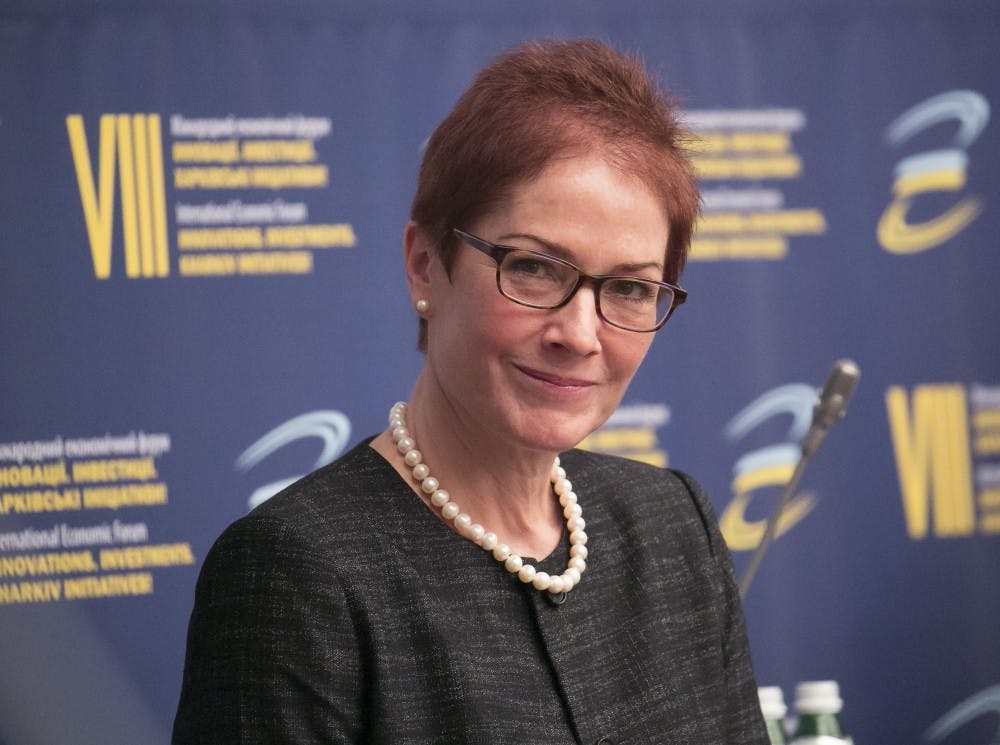After almost 35 years in the foreign service, former Ukrainian Ambassador Marie Yovanovitch ’80, a key witness during the House impeachment inquiry and a pivotal figure in the Senate’s ongoing trial, has retired from the U.S. State Department. Her exit comes after weeks of hostile impeachment proceedings, which have given rise to fresh allegations regarding her firing.
Former National Security Adviser John Bolton and Lev Parnas, an associate of President Donald Trump’s personal lawyer, Rudy Giuliani, have both shed light on the Trump Administration’s alleged misconduct in releasing Yovanovitch last May.
Most prominent in recent disclosures is Parnas’ allegation that Yovanovitch might have been under surveillance during her tenure in Ukraine. This charge stems from text messages that Parnas handed over to Congress during the House impeachment hearings in December.
The messages, which have not yet been verified by any official investigation, indicate that Connecticut congressional candidate Robert F. Hyde was surveilling the ambassador through electronic and physical means.
Investigations surrounding the matter have been opened by both Ukraine’s Ministry Of The Interior and the State Department.
U.S. legislators and the public have not yet been notified of any progress or conclusions reached by the State Department. Several Democratic Senators, immersed in the fast-paced impeachment trial, have begun asking questions of the State Department, as well as Secretary of State Mike Pompeo, about the status and timeline of the investigation.
New Jersey Sen. Bob Menendez, the ranking member of the Senate Foreign Relations Committee, has called for the State Department to brief Congress on the findings of their investigation. A letter sent to Pompeo and signed by 22 Democratic senators demands “an immediate and complete accounting of these troubling allegations.”
At one point, the lawmakers go so far as to accuse Pompeo’s State Department of “a disturbing and cavalier lack of seriousness regarding the protection of our diplomats.”

According to House Foreign Affairs Committee Chair Eliot Engel, Bolton told him about serious concerns regarding the administration’s firing of Yovanovitch.
“He strongly implied that something improper had occurred around her removal as our top diplomat in Kyiv,” Engel wrote in a statement on Jan. 29.
After the Senate voted on Friday, Jan. 31 not to hear evidence from new witnesses, information regarding the charges of surveillance and misconduct will not be a part of the formal impeachment deliberations that will culminate in a vote this Wednesday, regardless of the outcome of the State Department investigation.
Many take Friday’s vote as an indication that the Senate will likely acquit the President.

In any case, the inquiries will not affect Yovanovitch’s future in the State Department, as she has now officially left the agency.
In the administrations of Presidents George W. Bush, Barack Obama, and Donald Trump, Yovanovitch built a career of nonpartisan service.
From her first posting in Mogadishu, Somalia, to her ambassadorships in Armenia, Kyrgyzstan, and, finally, Ukraine, Yovanovitch was known for her competence and temperament. In a recent Associated Press report, former Ukrainian Ambassador John Herbst, her colleague and predecessor, described Yovanovitch as “a top-notch diplomat, careful, meticulous, [and] whip smart.”
Yovanovitch’s retirement follows the departure of many other career diplomats who found themselves embroiled in the events underlying President Trump’s impeachment, including former U.S. Special Representative for Ukraine Kurt Volker, former Ukrainian Ambassador William Taylor, and Senior Advisor to the Secretary of State Michael McKinley.
Since her dismissal in May, Yovanovitch has been working for the Institute For The Study Of Diplomacy at Georgetown University. She has remained on the State Department’s payroll.
Yovanovitch has yet to announce her next move.








